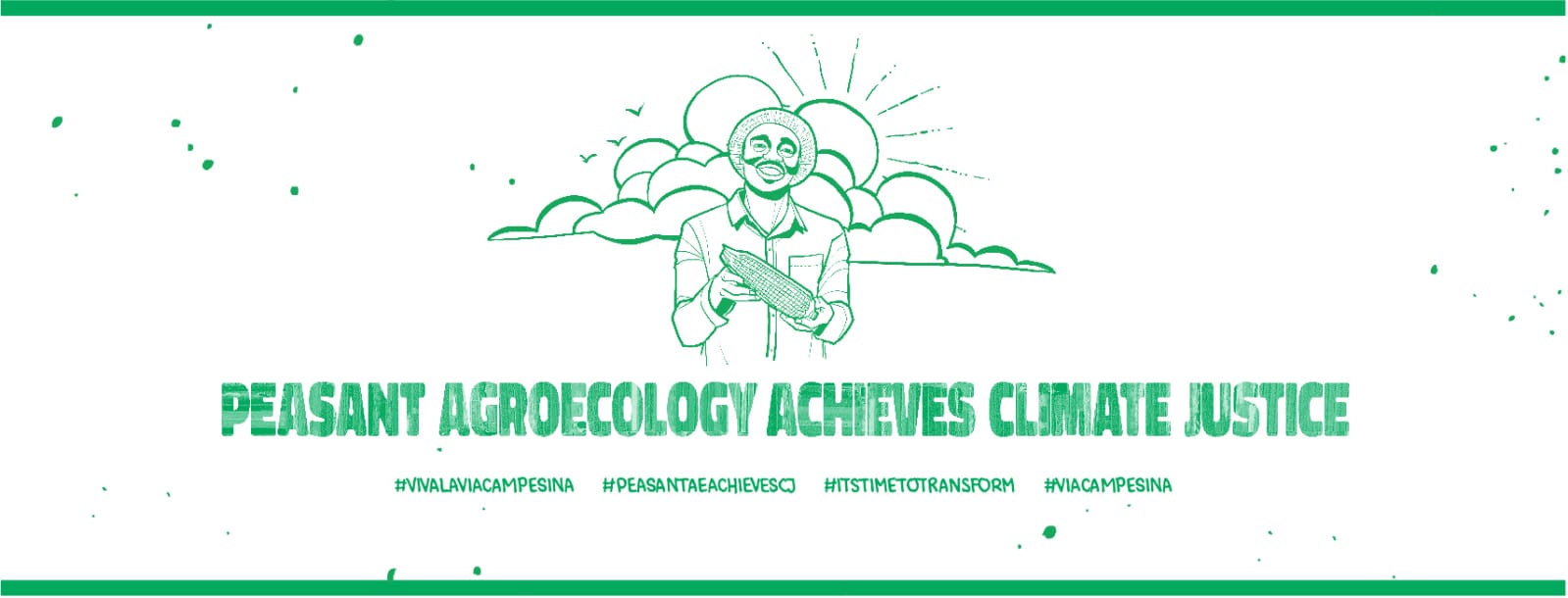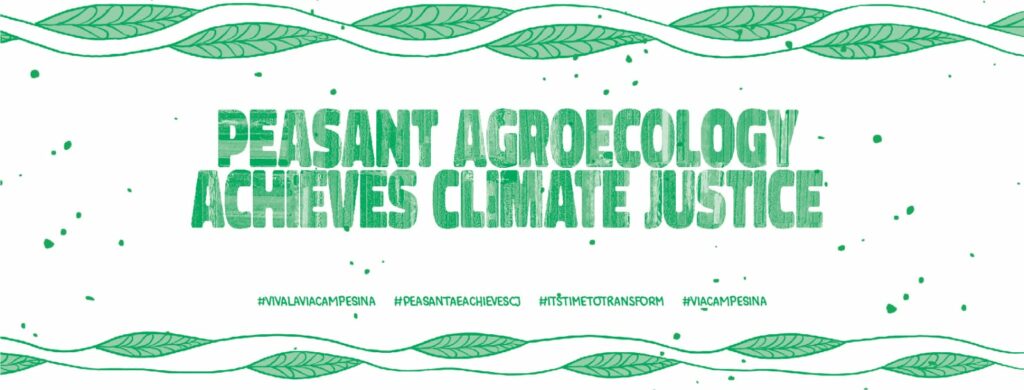COP26: Adopt Peasant Agroecology to Achieve Climate Justice and Keep Carbon Markets Out of the Paris Agreement

La Via Campesina Southern and Eastern Africa Press Release
To: Governments and negotiators, media and civil society,
(Morogoro, November 5, 2021) As COP26, takes place, in Glasgow from 1st – 12th November 2021, we, La Via Campesina Southern and Eastern Africa (LVC SEAf), join hands with other movements and allies regionally, continentally and globally to demand the integration of peasant agroecology and food sovereignty key pillars for a just transition, and to keep false solutions out of the Paris Agreement.
COP26 is the first time the Paris Agreement will be revisited and countries will need to show how they have met their national targets. We believe this year’s COP is a last chance to keep hopes alive of limiting warming to 1.5°C. At the current rate of emissions globally, the move to ensnare the voluntary carbon markets in the rules of the Paris Agreement, unaccountable markets and unrigorous rules, inexistence of the regulatory and bureaucratic infrastructures in many countries, we must demand rich countries to stop shirking their historical responsibilities and help drastically cut emissions at their source now. The current commitments made by Parties under the Paris Agreement already put us on course for a disastrous 3-5 degrees of warming.
International rules for carbon markets is a key item on the negotiating table in Glasgow, and under Article 6 we see carbon markets, “net zero”,” nature/based solutions”, climate smart-agriculture, and other false solutions becoming part of the Paris agreement this year.
Sub-articles 6.2 and 6.4, would further weaken the (already feeble) national plans of rich countries, and give those governments the access to continue polluting. This, in turn, would place a greater burden on developing countries especially African countries to implement offsetting activities and would revoke their right to a fair share of atmospheric space. This will inevitably lock us into even more emissions, further temperature rise, continued fossil fuel use and decades of inaction, distraction, and corporate power-grabbing.
The intrinsic flaws and loopholes of carbon markets, cap and trade schemes have made it impossible rendered these market-based schemes unworkable, and failed to reduce emissions or deliver real climate action. Burning carbon from fossil fuels in one part of the world cannot be ‘balanced out’ by offsetting carbon from natural land carbon cycles somewhere else — that is not how ecosystems work.
It has proven near impossible to track whether offsetting projects have actually taken place, and how much carbon has truly been offset. This has incentivized cheating. Creative accounting might make things look good on paper, but we cannot negotiate with the science. Instead of reducing emissions, carbon trading increases them.
The legacy of carbon offsetting schemes so far has included environmental crimes, conflicts, corporate abuse, forced relocation, and threats to food sovereignty and cultural genocide, particularly for Indigenous Peoples, smallholder farmers, forest dwellers, young people, women and people of colour. Carbon offsetting schemes are responsible for atrocities inflicted upon vulnerable populations around the world, and we reject them as a form of climate colonialism.
If a resolution on Article 6 is passed, and carbon markets become a significant part of a country’s efforts to implement their Nationally Determined Contributions (NDC), most governments will be forced to hand over control of much of their national climate policy to corporate-led false solution schemes. The corporate capture of our democratic decision-making institutions (such as our governments and the UNFCCC) sidelines credible and people-led solutions in favour of planet-wrecking corporate interests.
The COVID-19 pandemic has shone a light on the intimate and delicate links between humans, and our environment. The same unsustainable choices that are killing our planet are killing people. LVC SEAf calls on all countries to commit to decisive action at COP26 to limit global warming to 1.5°C – not just because it’s the right thing to do, but because it’s in our own interests.
We demand that rich countries stop shirking their responsibilities, and that all Parties commit to their fair share of the climate effort. We demand solutions that deliver emissions reductions at source and lead us toward a more just and equitable world. We demand real, additional, public finance from rich countries so that developing countries can transition towards just energy systems, adapt to climate impacts, and be compensated for irreparable loss and damage as stipulated under article 6.6. Article 6.8 discusses non-market approaches. We also demand from our own governments that public policy processes regarding climate respect the principle of Free, Prior and Informed consent, and integrate public transparency and democracy mechanisms, as outline in the UN Declaration on Peasant Rights (UNDROP).
As we celebrate 25 years of Food Sovereignty in the making, the agreements in COP26 are far from ensuring a food system that feeds people, in a way that is sensitive to the different types of food, the conditions of its production and the relationship between this food and the production processes with labour, with the environment, and with local and indigenous communities. We came to realize that peasant agroecology is a key pillar of the transition, and that market-based solutions will NOT deliver climate justice. Based on our own peasant experience, we say Peasant Agroecology Achieves Climate Justice!
Today, 5 November 2021, we take this chance to all launch the PEASANT AGROECOLOGY ACHIEVES CLIMATE JUSTICE WEB-DOC. The launch of this digital popular education tool is part of the LVC SEAf Peasant Agroecology Achieves Climate Justice Initiative. We invite you to join the climate justice movement and experience this innovative approach, integrating digital technologies, regional art and design, and peasant popular education. This tool is developed to be used by both individuals and organizations, of LVC SEAf and beyond, and is available here. We also invite you to keep linked into this space as new improvements and materials will continue to be integrated into the tool.
Download Statement in PDF
Also available in French and Portuguese

NO to Carbon Markets!
NO to False Solutions and Dangerous Distractions!
NO to Climate Colonialism! NO to Corporate Power and Impunity!
COP26: Real, Equitable Action Now!
GLOBALIZE THE STRUGGLE, GLOBALIZE HOPE!
Peasant Agroecology Achieves Climate Justice!
This post is also available in Français.
